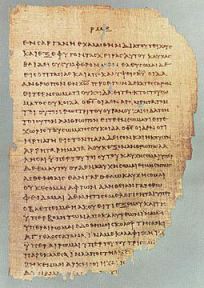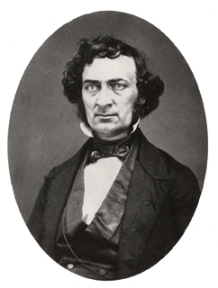According to unitarian Christian Andrews Norton (1786 - 1853), a long time professor at Harvard University and author of several books including the classic A Statement of Reasons for not Believing the Doctrines of Trinitarians concerning the Nature of God and the Person of Christ, what has happened to Christianity since its revelation by God through Jesus and his Apostles is a “monstrous phenomenon.” He explains,
. . . the fundamental truths of religion taught by Christianity became very early connected with human speculations, to which the same importance was gradually attached . . . These speculations spread out and consolidated into systems of theology, presenting aspects equally hostile to reason and to our faith; so hostile, that, for many centuries, a true Christian in belief and heart, earnest to communicate to others the blessings of his faith, would have experienced, anywhere in Christendom, a fate similar to that which his Master suffered among the Jews. . . this [is a] monstrous phenomenon. The false representations of Christianity that have come down to us from less enlightened times have ceased to retain their power over far the larger portion of those individuals who form, for good or evil, the character of the age in which they live. But the reaction of the human intellect and heart against their imposition has as yet had but little tendency to procure the reception of more correct notions of Christianity. On the contrary, the inveterate and enormous errors that have prevailed have so perverted men’s conceptions, have so obscured and perplexed the whole subject, have so stood in the way of all correct knowledge of facts and all just reasoning—there are so few works in Christian theology not at least colored and tainted by them, and they still present such obstacles at every step to a rational investigation of the truth—that the degree of learning, reflection, judgment, freedom from worldly influences, and independence of thought necessary to ascertain for one’s self the true character of Christianity is to be expected from but few. The greater number, consequently, confound the systems that have been substituted for it with Christianity itself and receive them in its stead, or, in rejecting them, reject our faith. The tendency of the age is to the latter result. (A Discourse on The Latest Form of Infidelity, 1839)
In short, the very sad truth is that “Christendom has done away with Christianity without being quite aware of it,” as the Danish theologian and philosopher Søren Kierkegaard (1813 - 1855) wrote—-quite more truly than he knew.
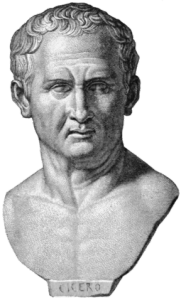
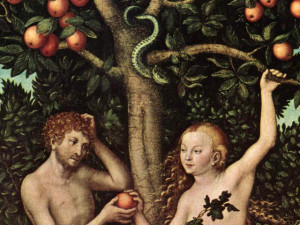 According to the Book of Genesis, after God created the first human beings, Adam and then Eve, he issued a specific command that they should not eat from “the tree of the knowledge of good and evil” (Genesis 2.17a). And he affixed to this command a sanction that should they disobey the command, then on that day they would “surely die” (Genesis 2.17b). The narrative then goes on to tell the story of how Eve, tempted by a speaking serpent, chose to disobey God’s command by eating of the fruit of the tree of the knowledge of good and evil (Genesis 3.1-6a). Moreover, we are told that Eve gave of the fruit to Adam, and he too then ate and thus disobeyed God’s command as well (Genesis 3.6b).
According to the Book of Genesis, after God created the first human beings, Adam and then Eve, he issued a specific command that they should not eat from “the tree of the knowledge of good and evil” (Genesis 2.17a). And he affixed to this command a sanction that should they disobey the command, then on that day they would “surely die” (Genesis 2.17b). The narrative then goes on to tell the story of how Eve, tempted by a speaking serpent, chose to disobey God’s command by eating of the fruit of the tree of the knowledge of good and evil (Genesis 3.1-6a). Moreover, we are told that Eve gave of the fruit to Adam, and he too then ate and thus disobeyed God’s command as well (Genesis 3.6b). 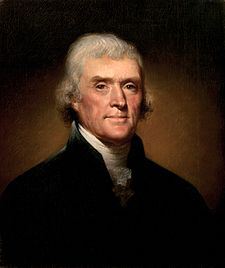 reveals his religious sentiments, pulling no punches about his revulsion to Calvinism and the trinitarian dogma (he calls it “tritheism”). In the course of the letter, he also endorses the teleological argument, or argument from design, making a rather eloquent presentation of the argument. Agree or disagree with the views he expresses (I disagree with his denial of the virgin birth of Jesus), the letter is a fascinating piece by any account. What strikes me most is the vehemence of his denunciation of Calvinism and that simply a mere mention of Calvin’s name from Adams (in his previous letter to Jefferson), and not even in a theological context, was enough to set Jefferson off into such a denunciation. Adams had only quoted Calvin’s exclamation to God during his infirmity late in life as a fitting expression of Adams own feeling toward the infirmity that beset him at the time he wrote the letter to Jefferson.
reveals his religious sentiments, pulling no punches about his revulsion to Calvinism and the trinitarian dogma (he calls it “tritheism”). In the course of the letter, he also endorses the teleological argument, or argument from design, making a rather eloquent presentation of the argument. Agree or disagree with the views he expresses (I disagree with his denial of the virgin birth of Jesus), the letter is a fascinating piece by any account. What strikes me most is the vehemence of his denunciation of Calvinism and that simply a mere mention of Calvin’s name from Adams (in his previous letter to Jefferson), and not even in a theological context, was enough to set Jefferson off into such a denunciation. Adams had only quoted Calvin’s exclamation to God during his infirmity late in life as a fitting expression of Adams own feeling toward the infirmity that beset him at the time he wrote the letter to Jefferson. 